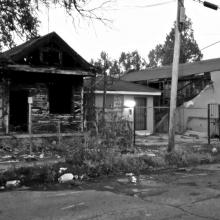working poor
For my privileged, perhaps overly comfortable children, something as trivial as our Internet being down constitutes a crisis. When we do our “gratitude inventory” (aka, a way to get them to reflect and pray), they rattle off things as a matter of routine that many people would only dream of.
So how do I explain something as alien and complex a state as being part of the working poor in a way they can have a at least a chance to internalize?
This was part of my goal in taking on My Jesus Project, a year-long endeavor to more deeply understand what we mean when we talk about following Jesus: to move from ignorance to empathy, which can only be achieved sometimes through direct, personal experiences.
For a month, I was assigned by one of my “Jesus Mentors” to go out of my way to walk and/or take public transportation to get places, with the intention that I would come into contact with people I might otherwise miss or overlook. As I did it, I realized my kids could benefit from it as well.
The first sign that they needed such an experience was that when I announced to them we were taking the bus and train to do our family activities one weekend, they were excited. It was a new experience for them, rather than a necessity. As for the mile-long walks to get from place to place when the transit system didn’t get us exactly where we were going — they were a little less thrilled with that. And yet, we slowed down more, spent more time talking, and while on the public systems, I noticed we looked each other in the eye a lot more, rather than all facing forward (with the kinds inevitably with their faces fixed on a screen) in the car.
My son, Mattias, who is on the high end of the autism spectrum, is a keen observer, and I suppose a natural byproduct of that is that he asks questions. A lot of questions.
“Dad,” he said, after jumping off the final leg of the bus route one day, “why were some of the people sleeping on the bus?”
Eric Sapp writes for The Huffington Post:
In recent years, there has been a trend in politics away from any mention of the poor. Republicans never really paid them any mind, but Democrats have been convinced they should not make any mention of the poor, and instead, focus exclusively on the middle class. The decision to stop talking about the poor was, for Democrats, based on polling data. Pollsters have tested traditional progressive language about the "poor, vulnerable, and needy" and seen that voters don't have a very high opinion of those groups. Furthermore, polling shows that most voters want to self-identify as "middle class."
Because of all of this, many Democrats have reached the conclusion that mentioning the poor or openly championing policies that explicitly benefit them is a political loser. This conclusion has very dangerous policy and strategic implications (especially with the looming sequestration debate) and will ultimately box Democratic leaders into a corner where they have no choice but to sacrifice programs that struggling American families depend on the most. Thankfully, in this case, we don't have to choose between doing what is right and what works politically.
Read more here.
Much has been said by politicians and the press in this campaign. In three presidential debates alone, we've heard the two contenders for our nation's highest office speak of tax cuts, deficits, jobs, and the middle class literally hundreds of times.
But much has also been left unsaid. In those same presidential debates, poverty was hardly featured and the word "inequality"didn't appear at all.
How can it be that the Holy Bible refers to helping the poor and vulnerable more than 2,000 times, yet two professing Christians running for president of the United States disregard this unholy scourge?
As we did not hear in the debates, nearly 50 million Americans are currently living in poverty – more than at any other time in our nation's history – and between a third and half of all Americans are within a few lost paychecks of the poverty line. When a quarter of all American jobs pay less than poverty line wages for a family of four, systemic poverty and inequality become more than abstract economics: they are moral and Constitutional concerns.
So they should be treated by the men and women who aspire to lead our country.
From Salon yesterday:
Last Friday, the U.S. Government announced that 7.2 percent of Americans in the labor force earn so little that they are living in poverty. Reuters noted that the percentage of the working poor is the highest in at least two decades. The rate was 7 percent in 2009, 5 percent in 1999, and 5.5 percent in 1987.
Read the full story here

Cereal image via Wylio http://www.wylio.com/credits/Flickr/5399595876
She bit her bottom lip first, then lifted her gaze to my unassuming face. When she started looking at me softly, like I was some sort of oft-beaten puppy, I knew what was coming.
“I’m so sorry,” she whispered, “but your card’s been declined.” I offered a solution.
“Huh. Want to try it again?” Unsurprisingly, nothing changed, save her face, which only contorted more.
“Weird,” I said. The steam tauntingly danced on my cheeks. “Let me go check with my bank and figure it out.” I walked to a table, leaving the coffee, and pulled out my computer. After entering my username and password, my statement appeared on the screen.
“Available Balance: -$10.41,” it read.

